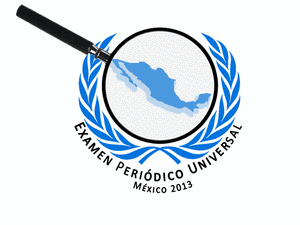 Civil society organizations express alarm that Mexico has once again rejected UPR recommendations to eliminate arraigo.
Civil society organizations express alarm that Mexico has once again rejected UPR recommendations to eliminate arraigo.
- Likewise, Mexico did not accept the recommendation regarding jurisdiction of the Committee on Enforced Disappearance.
- Organizations await the creation of a follow-up mechanism to implement accepted recommendations.
March 20, 2014. Today in the UN Human Rights Council in Geneva, Switzerland, Mexico presented its responses to the 176 recommendations it received last October in its second Universal Periodic Review.
During the 25th regular session of the Human Rights Council, Mexico accepted the majority of recommendations, but rejected several others that concern topics such as the need to abolish arraigo and to recognize the jurisdiction of the UN Committee on Enforced Disappearances to receive individual cases.
Mexico accepted recommendations regarding the ratification of multiples international instruments, including the Optional Protocols for the International Covenant on Economic, Social, and Cultural Rights and the Convention on the Rights of the Child (although we note that in relation to this last subject, the government has still not published the Law for the Protection of the Rights of Girls, Boys, and Adolescents or put into place the National System to Guarantee the Rights of Children and Adolescents). The implementation of these recommendations would expand access to justice at the international level for victims of human rights violations, and it is imperative that the Senate ratifies these instruments.
Mexico faces important challenges in the implementation of the recommendations accepted in the realms of eliminating discrimination, eradicating poverty, and guaranteeing economic, social, and cultural rights.
In relation to the rights of women, Mexico received 43 recommendations, all of which were accepted. In this sense, the greatest challenge is to ensure that these commitments turn into effective measures to protect women’s human rights in conditions of equality with men and free from violence. In the area of reproductive rights, we highlight the need for federal and local authorities to implement the four accepted recommendations. Likewise, the member States of the Human Rights Council issued 24 recommendations regarding the alarming situation of human rights defenders and journalists.
The undersigned civil society organizations express our rejection of Mexico’s decision not to accept the UPR recommendations that urge it to eliminate arraigo. Once again, as in 2009, the Mexican government justified the use of arraigo and added that it had approved a reform to reduce the maximum time of arraigo. However, this reform has not in fact been approved by the Senate and in any case, arraigo openly violates human rights as well as being entirely ineffective as a tool of investigation, and already contravenes international standards and the recommendations of more than 9 international bodies that have called for its elimination.
In addition, while Mexico accepted the majority of recommendations related to enforced disappearance, we are concerned by its rejection of recommendation 148.5, which urges the State to accept the jurisdiction of the Committee on Enforced Disappearances to receive individual and inter-State cases. Taking into account the more than 26,000 cases of reported disappearances in the country and the role of Mexico in the adoption of the International Convention for the Protection of all Persons from Enforced disappearance (which created the Committee), as well as the impunity and lack of access to justice in Mexico, we call on the government to maximize access to truth, justice, and reparations both nationally and internationally in cases of enforced disappearance.
Finally, we wish to emphasize that the second UPR of Mexico is by no means over. As the government recognized, this moment marks the beginning of a national process that will require the design and implementation of a follow-up mechanism to guide the implementation of the accepted recommendations. Civil society organizations will monitor this process to ensure that, unlike in the first UPR, this mechanism has clear indicators to measure progress, so that the commitments made by Mexico are not limited to the report presented in Geneva, but rather translate into real changes to improve the human rights situation on the ground.
Signatory organizations:
Arthemisas Equidad A.C.
Asistencia Legal por los Derechos Humanos
Balance A.C.
Católicas por el Derecho a Decidir (CDD)
Centro de Derechos Humanos de las Mujeres - CEDHEM
Centro de Derechos Humanos de la Montaña “Tlachinollan”
Centro de Derechos Humanos Fr. Francisco de Vitoria O.P., A.C.
Centro de Derechos Humanos Fray Matías de Córdova, A.C
Centro de Derechos Humanos Miguel Agustín Pro Juárez
Centro Diocesano para los Derechos Humanos Fray Juan de Larios
Centro Interdisciplinario para el Desarrollo Social (Cides), I.A.P.
Centro Mexicano de Derechos Ambiental – CEMDA
Centro Regional de Derechos Humanos Bartolomé Carrasco Briseño A.C.
Ciudadanos en Apoyo a los Derechos Humanos – CADHAC
Comisión Mexicana de Defensa y Promoción de los Derechos Humanos – CMDPDH
Comisión de Solidaridad y Defensa de los Derechos Humanos A.C.
Comunicación Comunitaria A.C.
Consorcio para el Diálogo Parlamentario y la Equidad Oaxaca
Coordinadora Popular de Madres Educadoras COPOME
DECA Equipo Pueblo, A.C.
Documenta Análisis y Acción para la Justicia Social A.C.
Equis: Justicia para las Mujeres
Fray Bartolomé de las Casas A.C.
Grupo de Información en Reproducción Elegida – GIRE
Instituto Mexicano de Derechos Humanos y Democracia, A.C.
Jass, Asociadas por lo Justo
Melel Xojobal A.C.
Observatorio Ciudadano Nacional del Feminicidio
Organización para el Desarrollo Social y la Educación para todos ODISEA, A.C.
Programa Niños de la Calle A.C.
Red Mesa de Mujeres de Ciudad Juárez
Red Nacional de Organismos Civiles de Derechos Humanos Todos los Derechos para Todas y Todos
Red por los Derechos de la Infancia en México – REDIM
Shottama A.C.
